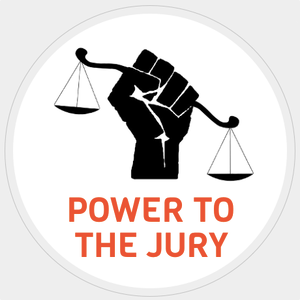The Volokh Conspiracy
Mostly law professors | Sometimes contrarian | Often libertarian | Always independent
Does Jury Nullification Undermine the Rule of Law?
In theory, yes. But not in the world we actually live in, where law enforcement is already rife with numerous discretionary decisions made unavoidable by the fact that we have far too many laws.

In a recent post at the Law and Liberty website, conservative legal commentator Mark Pulliam takes issue with defenders of jury nullification, including myself. Jury nullification occurs when jurors acquit a defendant who they believe to be guilty because they conclude that the law he or she violated is unjust or carries overly harsh penalties. Pulliam's main concern is that nullification could undermine the rule of law:
The rule of law is essential to the preservation of liberty. Friedrich Hayek, perhaps this century's pre-eminent theorist of classical liberalism—the political philosophy of freedom—believed that the defining characteristic of a free society is the rule of law, meaning legal rules stated in advance, uniformly applied, without excessive discretion. In Hayek's words: "[W]hen we obey laws, in the sense of general abstract rules laid down irrespective of their application to us, we are not subject to another man's will and are therefore free." Thus, it is the universal, non-selective nature of law that allows us to be free. In Hayek's view, it is precisely because judges and juries cannot pick and choose what laws to enforce in a particular case "that it can be said that laws and not men rule.
There is some truth to this argument. Relative to a system where laws really are "uniformly applied, without excessive discretion," jury nullification can indeed undermine the rule of law. This sort of consideration is one of the reasons why I used to oppose jury nullification myself. But, sadly, we do not in fact have such a system. In the real world, law enforcement is already characterized by wide-ranging discretion, because we have vastly more laws than we can possibly enforce - and vastly more violators thereof than the authorities can possibly go after. The data indicate that a large majority of adult Americans have violated federal criminal law at some point in their lives - to say nothing of the many state and local laws. Some 52 percent admit to using marijuana in violation of both federal law and that of many states; the true percentage of users is likely higher, as some may not be willing to admit it to pollsters.
With so many lawbreakers to choose from, police, prosecutors, and politicians cannot avoid exercising wide-ranging discretion about which ones to target and which ones to let go. For this reason, jury nullification is not introducing an element of discretion in an otherwise rule-bound system. Rather, it serves as a counterweight to the enormous discretionary power already wielded by government officials. I expanded on that point here:
The case for jury nullification today is strengthened by the enormous growth of modern criminal law, which has expanded to the point where almost all of us are guilty of some crime or other…. In a world where almost everyone is a criminal, there is already enormous arbitrariness, because prosecutors can only go after only a small percentage of the many perpetrators. Jury nullification is unlikely to make that situation worse than it already is.
Moreover, many of the crimes on the books are ones that either should not be illegal at all, or should not carry such harsh penalties. As a practical matter, jury nullification is much more likely to target those kinds of laws than ones that rest on a broad social consensus to the effect that the activities they ban should be criminalized and violators subjected to severe punishment.
Even in a legal system with less discretionary authority than our own, jury nullification might still sometimes be justified. Consider a deeply unjust law such as the Fugitive Slave Act of 1850. Even if it were enforced in a predictable, uniform, and nondiscretionary fashion, it would still be a great evil; in some ways it would be an even greater evil than if officials let many violators go. And conscientious jurors would be justified in nullifying it (as some northern juries in fact did). The rule of law is an important value. But it is not the only important value, and can sometimes be outweighed by other considerations.
This is not to say that jury nullification is a magic bullet for all the ills of our criminal justice system, or even that it is always a good thing. Ultimately, the best solution to the problem of overcriminalization is to cut back on the amount of criminal law.
And jury nullification can sometimes be used for bad ends, as well as good ones - such as the notorious Jim Crow-era cases where all-white jurors acquitted whites guilty of racially motivated crimes against African-Americans. In this day and age, where racial prejudice is less severe than fifty years ago, and minorities are themselves able to serve on juries to a far greater extent than in the days of segregation, I believe the benefits of nullification outweigh the risks. But we certainly should not ignore the latter.
In a more ideal legal system, where the amount of law is strictly limited and there are few or no unjust restrictions on liberty, there would be little if any legitimate role for jury nullification. In the far more problematic system we actually have, it is a useful check on government power that deserves support, even as we remain aware of potential downsides.


Show Comments (43)